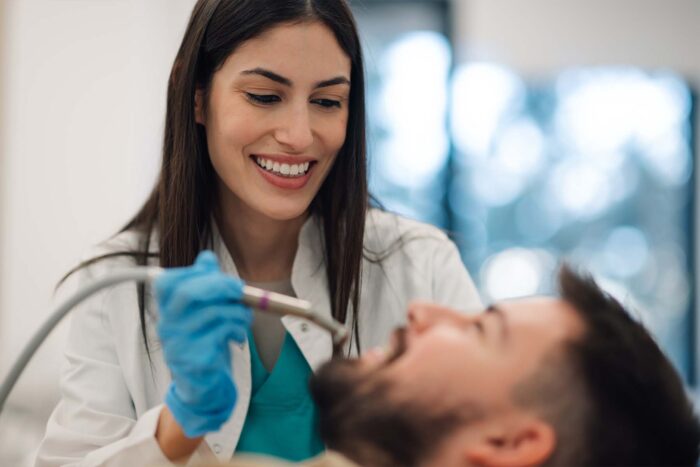What Is Preventive Dentistry?
Preventive dentistry covers anything that helps you avoid dental problems in the first place. That includes both what we do in the clinic and what you do at home.
In the clinic, preventive dental care includes:
- Dental checkups
- Professional cleanings
- Fluoride treatments
- Dental sealants
- X-rays to catch issues early
- Oral cancer screenings
At home, preventive dental care means:
- Brushing twice a day with fluoride toothpaste
- Flossing once a day
- Eating a balanced diet
- Drinking water
- Avoiding tobacco
When these things work together, your chances of developing cavities, gum disease, or other dental problems go way down.

Why Preventive Care Is So Important
Most dental problems don’t just appear overnight. Cavities, gum disease, and even tooth loss usually happen slowly over time. Preventive care focuses on early detection and treatment, which helps stop small issues from turning into bigger problems.
When you stay on top of your dental health:
- Treatment is easier, faster, and less expensive
- You’re less likely to need things like fillings, root canals, or extractions
- You protect your overall health, not just your mouth
Poor oral health has been linked to other health concerns, like heart disease. Taking care of your mouth is a simple way to support your overall health.
What Happens at a Preventive Appointment?
If it’s been a while since your last visit, here’s what you can expect at a typical preventive care appointment:
Professional Cleaning: We remove plaque and tartar buildup that you can’t reach with brushing and flossing alone.
Dental Exam: We look for signs of decay, worn enamel, gum disease, or any changes in your mouth that might need attention.
X-Rays (If Needed): X-rays help us see what’s happening beneath the surface, especially between teeth and below the gums.
Fluoride Treatment: Fluoride strengthens your enamel and helps prevent decay. We may recommend it based on your needs.
Dental Sealants (Optional): Sealants are a simple way to protect your back teeth from cavities, especially for kids and cavity-prone adults.
Home Care Tips: We talk through your routine and help you make small changes that can lead to big improvements.
How Often Should You Visit?
Most people do well with a checkup and cleaning every six months. But everyone is different. If you’ve had gum disease, a lot of dental work, or other health issues, we may recommend more frequent visits.
We’ll work with you to find the right schedule based on your needs.
What About Preventive Care at Home?
Here are some habits that really make a difference:
- Brush your teeth twice a day with a fluoride toothpaste
- Floss daily to clean between your teeth
- Drink water throughout the day
- Cut back on sugar (especially sticky snacks and sugary drinks)
- Don’t ignore bleeding gums or tooth pain, as they are early warning signs
- If you grind your teeth or play sports, talk to us about getting a custom mouthguard
Consistency is more important than perfection. If you’re not sure your routine is working, ask us; we’re happy to help.
Early Signs of Dental Problems to Watch For
Most dental issues start small, and spotting those early signs can help you avoid bigger problems later. If you notice any of the following between visits, it’s a good idea to book a checkup:
- Bleeding when you brush or floss
- Gums that feel swollen or tender
- Ongoing bad breath or a bad taste in your mouth
- Sensitivity to hot, cold, or sweet foods
- A dark spot, chip, or crack in a tooth
- Pain when chewing or biting
- A tooth that feels loose or just “off”
Preventive Dentistry for All Ages
For Kids: We focus on building good habits early, with gentle cleanings, fluoride treatments, and dental sealants to protect their back teeth. We also make visits easy and comfortable, so kids feel comfortable coming to the dentist.
For Adults: Preventive care helps maintain healthy gums, catch decay early, and prevent wear from grinding, clenching, or past dental work. We also watch for signs of gum disease, which can often progress quietly.
For Seniors: As we age, it’s common to deal with dry mouth, root exposure, and gum recession. Many seniors also want to preserve crowns, bridges, or dentures. Preventive visits help us protect what’s working and manage any changes.

Already Have Dental Problems?
Preventive care is still for you. If you’ve had issues in the past, regular dental visits and home care help you avoid setbacks and reduce your risk of future problems.
We take a no-pressure, no-blame approach. Our job is to help you get where you want to be and keep your smile healthy moving forward. A large part of what we do is to educate, empower and give you the tools to maintain a healthy mouth through general dentistry and cosmetic dentistry.
The Long-Term Benefits of Preventive Dentistry
Preventive dentistry saves more than just your teeth; it saves time, money, and stress. Catching problems early usually means less invasive treatments and fewer complications. It also helps avoid dental emergencies, which often happen at the worst possible time.
And because dental health is closely tied to your overall well-being, keeping your mouth in good shape can have a ripple effect throughout your body. People with healthy gums and teeth tend to feel more confident, enjoy better nutrition, and have lower risks for other health conditions.

